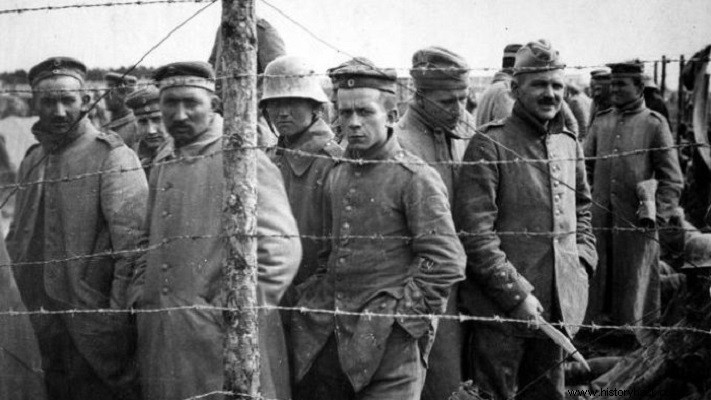
As in every war, in World War I there were civilian deaths, murders, mass executions. The Germans were repeatedly accused by the ANTATE of executions of civilians - which existed on a small scale - in Belgium and France, they were accused as barbaric murderers for the sinking of the ocean liner "Lusitania", for the bombing of London, etc.
This was supposed to be the generative cause that the Allied soldiers and mainly the British and those of the Occupations murdered in cold blood Germans who had either surrendered or were trying to surrender. "...the German pigs have done such terrible things in France and Belgium by cutting off children's hands and women's breasts"...says a British soldier in a letter to justify his hatred of the Germans, based on Allied propaganda.
But all this was nothing but an absurdity. It is worth noting that at Christmas 1914, when the German invasion of Belgium and France was most recent, as well as any executions of civilians, the German, British and French soldiers came out of the trenches and fraternized, exchanged gifts, played football.
How then was there no hatred and the Allied soldiers remembered any German deviations in 1915 and after? The collusion of 1914 had alarmed the Allied leadership and efforts were made to prevent such incidents from occurring again. Cultivating hatred was one way.
“German soldiers had fallen to their knees and were holding pictures of their wives or children above their heads, but we killed them all,” reports a British soldier. “We killed in cold blood because it was our duty to kill as many as we could. I was thinking of the Lusitania," he wrote.
"We took 10 German prisoners and as we had just learned of the sinking of the Lusitania we killed them all by hitting them with the stocks of our rifles" , said another Briton. “…I saw a Hun (as the British called the Germans) running with his hands up… he was screaming for mercy. I shot him immediately," wrote another Briton.
Many British soldiers and those of the Possessions elaborated in letters, testimonies and memoirs that they left that they were often ordered from above not to take prisoners. A soldier cites the words of a brigadier, shortly before the attack on the Somme, telling the men:"Take prisoners, but I don't want to see them...".
The 17th Highland Light Infantry was formally ordered to take no prisoners. "No mercy to the enemy, no prisoners", the order said. The official excuse for killing prisoners was that no men could be provided to guard it, or that the soldiers had to share their food rations with them and thus starve themselves.
“Tomorrow morning you will go into battle and if you are captured your food rations will be cut. So take no prisoners. Kill them. if you catch him they will eat from your own rations", said a British military PRIEST to the men of the Royal Dublin Fusilliers who were preparing to attack.
“The Royal Scots Regiment took about 300 German prisoners. The officers told the men to share their food with them. The Scots killed them all at once… in a few minutes the blood of the Germans covered the feet of the Scots” , reports a soldier eyewitness to the incident that took place in 1915 in Ypres.
The above incidents record a climate that existed and an attempt was made to consolidate it. Of course the number of murdered prisoners was minimal compared to the dead of battles, hardships, or diseases. Most Germans who surrendered were taken to camps and treated well.
The Germans also committed murders of prisoners. Accordingly, the Austrians committed terrible atrocities in Serbia and less so on the Eastern Front. As for the mass executions and burning of villages by the Germans, these occurred mainly in the early stages of the war due to the fear of insurgent strikes in the rear of the German army.
Also the "Lusitania", which Allied propaganda tried and succeeded in establishing as a symbol of German barbarity, was not an innocent ocean liner as it carried, in violation of international rules, (officially) 750 tons of munitions. In 2008, divers recovered ammunition from its wreck.
